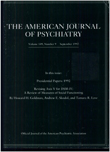Sleep disturbances in survivors of the Nazi Holocaust
Abstract
OBJECTIVE AND METHOD: Sleep disturbances are commonly reported by victims of extraordinary stress and can persist for decades. This study was designed to test the hypothesis that survivors of the Nazi Holocaust would have significantly more and different sleep problems than depressed and healthy comparison subjects and that the severity of the survivors' problems would be correlated with length of time spent in a concentration camp. Forty-two survivors, 37 depressed patients, and 54 healthy subjects of about the same age, all living in the community, described their sleep patterns over the preceding month on the Pittsburgh Sleep Quality Index, a self-rating instrument that inquires about quality, latency, duration, efficiency, and disturbances of sleep, use of sleep medication, and daytime dysfunction. RESULTS: The survivors had significantly greater sleep impairment than the healthy comparison subjects, as measured by all subscales of the index, but had less impairment than the depressed patients except on the sleep disturbances and daytime dysfunction subscales. However, for specific items within these subscales, survivors had significantly more frequent awakenings due to bad dreams and had less loss of enthusiasm than the depressed subjects. Sleep disturbances and frequency of nightmares were significantly and positively correlated with the duration of the survivors' internment in concentration camps. CONCLUSIONS: These findings suggest that for some Holocaust survivors, impaired sleep and frequent nightmares are considerable problems even 45 years after liberation.
Access content
To read the fulltext, please use one of the options below to sign in or purchase access.- Personal login
- Institutional Login
- Sign in via OpenAthens
- Register for access
-
Please login/register if you wish to pair your device and check access availability.
Not a subscriber?
PsychiatryOnline subscription options offer access to the DSM-5 library, books, journals, CME, and patient resources. This all-in-one virtual library provides psychiatrists and mental health professionals with key resources for diagnosis, treatment, research, and professional development.
Need more help? PsychiatryOnline Customer Service may be reached by emailing [email protected] or by calling 800-368-5777 (in the U.S.) or 703-907-7322 (outside the U.S.).



